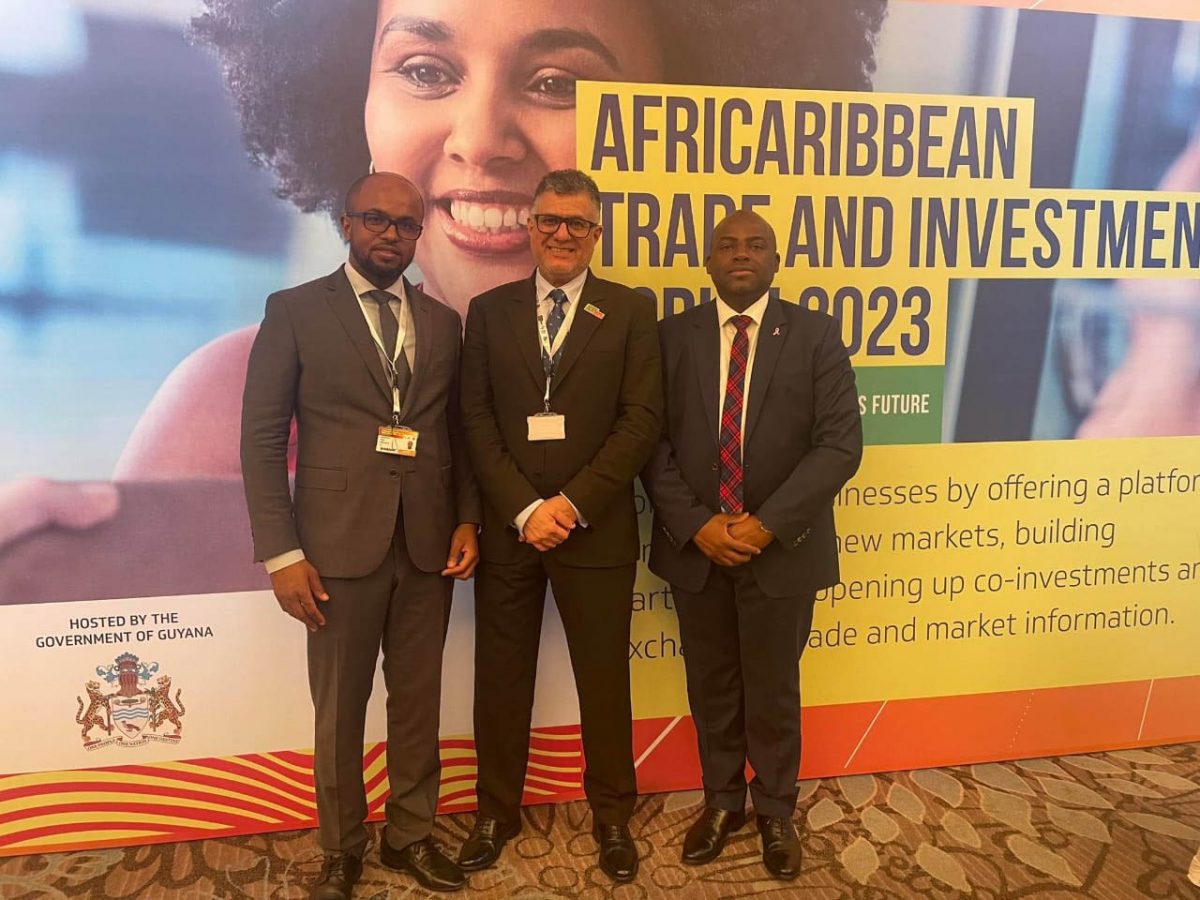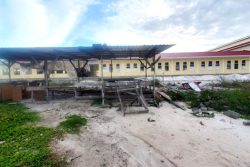With Guyana being one of its two Caribbean shareholding members, the International Islamic Trade Finance Corporation (ITFC) has proposed trade finance support in a number of areas to this country at competitive terms that it believes cannot be beat, Chief Operating Officer Nazeem Noordali has said.
ITFC has a special focus on health, agriculture and energy trade to enable countries like Guyana to be better prepared for future global emergencies.
“Guyana being a member, we [ITFC} are bound to look at activities we can do here to support local communities which is all the people through the government, the business community… and so forth,” Noordani told the Stabroek News during an exclusive interview, on the sidelines of the recently concluded AfriCaribbean Trade and Investment Forum (ACTIF), held by the African Export-Import Bank (Afreximbank) in collaboration with the Government of Guyana.
The ITFC/IsDB team, which included Senior Manager Relationship Manage-ment Trade Finance ITFC/ Islamic Deve-lopment Bank Group (IsDB) Said Ben Afane Ibouroi, and Divisional Manager for Africa and Latin America Mubarak Elegbede, underscored the institution’s mandate in providing trade development activities that will help this country’s economic development.
When they met Minister of Finance Dr Ashni Singh, Noordani said, the same message was relayed. “We are here to explore how we can support the economy of Guyana through our main activity which is trade finance in the form of export finance, supply chain finance, working capital finance, structural commodity finance…,” Noordani said.
“Our focal point in Guyana is the Ministry of Finance. So over the next two days we have meetings with the government though the Ministry of Finance. Then possibly, the Ministry of Health, Ministry of Agriculture and so on,” he added.
“The importance of health and the health sector were highlighted during COVID-19 when there was a need for importing medical supplies. We were involved a lot in supplying medicine and medical supplies. It was more of a strategic import, for our member countries during that difficult time.”
He pointed out that especially Middle Eastern, African and Caribbean countries faced hardships accessing vaccines, even when some could afford it and that period reinforced to institutions like his that countries need to be prepared for any eventualities or emergencies.
According to the ITFC, supporting member countries’ specific needs was singled out as it also pointed to initiatives taken during COVID. “The emergence of COVID-19, which was declared a global pandemic by the WHO at the start of 2020, shocked the world. Aside from the impact on healthcare, the pandemic has wreaked havoc on the global economy, raising concerns about the long-term consequences of the looming global financial crisis. The IsDB Group’s prompt response and call for collaborative action to support our member countries at different phases of the recovery trajectory has resulted in a Strategic Preparedness and Response Programme worth up to US$2 billion, under the 3Rs (Respond, Restore, and Restart),” the group said.
“Under the Integrated Trade Solution mechanism, ITFC supplied member countries in need with the required support for the critical sectors, including the provision of medical equipment and food to address the challenges during the pandemic, in accordance with the IsDB Group’s 3Rs Response Package,” it added.
Noordali explained that agriculture is also a focus because food commodities “form such a big part of trade, in terms of food and food security.”
In this area, ITFC provides finance for fertilisers and looks at import of food items to see what the requirements are and how it can be helpful in order to push those trades, he explained.
ITFC says that special initiatives in line with its goals of gaining a foothold in rising trade concerns are created in collaboration with other multilateral development institutions to address specific key issues over a long period of time.
“Special initiatives enable ITFC to maintain relationships with organisations that have developed expertise on issues that inform and add value intra-OIC work. Regional cooperation and integration, trade facilitation, digital trade, and agri-tech are among the special initiatives that span numerous thematic priorities. A focus on building partnerships for programme delivery to attain scale is a key feature of the special initiatives. ITFC can have a greater impact and provide more support to member countries and other stakeholders in advancing trade by forming partnerships,” it stated.
“We were established in 2008 to do trade finance and today is 15 years of activities. We existed in IDB since 1977. We have more than 45 years in trade finance as a multilateral. From 2008 up to now we have done more than [US]$70 billion of trade finance in our member countries. This is mainly supporting trade flow between Africa and Asia and Gulf countries and African countries. Coming here, we want to bring that expertise to Guyana. We are a unique institution that has that expertise,” Noordali said.
Asked about the interest and terms of financing offered, the ITC COO was quick to say that what they offer was most competitive globally and any research would reveal this fact.
He explained that the terms of lending follows Islamic Shariah-compliant laws, which were not a profit driven initiative but centred on people development and empowerment.
“That is a very important part. We don’t charge interest, we do what we call a markup on our finance,” he said.
“We do it in such a way that we add the markup, it is like an interest rate but it is legally different. So the rate of the markup is quite competitive and much better than interest rates received by other [lending institutions]. We do so that the country would benefit; that the people would benefit.”
An overview states that ITFC provides Shariah-compliant trade finance for both public and private sector entities in member countries and beyond, with a particular focus on intra-OIC trade transactions.
“Farmers, cooperatives, manufacturers, refineries, traders, and service providers all stand to benefit from our wide range of financing products. From import, pre-export and export finance to buyer’s credit, structured commodity, supply chain and line of finance, our products are designed to facilitate trade throughout its entire cycle and across the value chain,” the ITFC explains.
President Ali has already said that this country will not accept interest rates higher than 4%.
Questioned on if the group had proposals on any special projects it would share with Guyana’s government, Noordali explained that while they have done research and know what the country’s needs are, it was not their place to propose to government any project, but hear from Guyana what its needs were and see how they can best support those.
“We are looking at trade finance .We have done research and we come and talk to our stakeholders here to see what is the reality on the ground and what they need. Then we can talk. We look at what is your [country’s] priority, what is the focus of your national development plan of the country, and see how we fit in to support that, rather than imposing that this is what we have to offer,” he explained.
“So you have to tell us what you want; what are your needs and how you believe we can fit into your socioeconomic model and we will share what we offer and how we can work together. It is a partnership…,” he added.
ITFC is also a longstanding partner of Afreximbank, which recently offered a US$500 million purse to this country to assist in hastening Guyana’s infrastructural development agenda.
At the ongoing Intra-African Trade Fair being held in Cairo, Egypt, renowned Arab banker Nasser M Al-Thekair hailed the work of the ITFC in assisting countries in agriculture initiatives. Al Thekair who sits on the boards of the Maldives Islamic Bank, the Arab Africa Trade Bridges Pro-gramme, the Institute for Trade and Inno-vation, the ICC MENA Region Banking Commission and the ITFC’s Trade Deve-lopment Fund among others, said that the institution’s work was unwavering.
“ITFC’s commitment to food security is unwavering. Our Sharia-compliant financial instruments as well as our development engagements such as Technical Assistance & Capacity Building, continue to empower various stakeholders within the #agriculture sector with a focus on small-scale farmers. Our programs such as the Groundnut development in #Gambia & #Senegal and value chain development for cashew nuts in #Guinea, offer access to markets, fostering increased productivity and #income. Our recent US$ 4.5 billion Food Security Response Program demonstrates our dedication to ensuring resilience and securing essential #food supplies during crises, with US$1.8 billion contributed in 2022 alone,” he posted on his social media page. “ITFC strategically enhances agricultural value chains for exports, focusing on flagship programs such as the AATB #program to improve productivity, quality, and #market access. This initiative not only fuels #exports but also creates local jobs, supports processing industries, and adopts #innovativetechnologies for a modern and #sustainable approach.”








